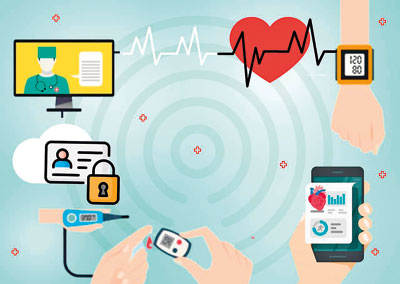Pod Technology and Data Security: Empowering Healthcare Providers in Sri Lanka to Deliver Patient-Centered Care
View(s):“In recent years, healthcare providers in Sri Lanka have been exploring the use of pod technology and data security measures to improve healthcare delivery and patient outcomes. Pod technology refers to the use of portable medical devices, such as sensors and monitors, to collect patient data in real-time. These devices can provide a wealth of information that can be used to diagnose and treat patients more effectively. Data security measures, such as encryption and access controls, can help ensure that patient data remains confidential and secure. The importance of using pod technology and data security measures in healthcare delivery cannot be overstated. These technologies have the potential to provide more accurate and comprehensive patient data, which can lead to better diagnosis, treatment, and management of chronic conditions, such as diabetes and hypertension. Furthermore, data security measures can help protect patient data from unauthorised access, theft, or misuse, ensuring that patients can trust their healthcare providers to keep their personal information safe. In this article, we will explore the use of pod technology and data security measures in healthcare delivery in Sri Lanka. We will discuss the current state of healthcare delivery in Sri Lanka, the potential benefits of using these technologies, the challenges of implementation, and successful examples of their use in Sri Lanka. Ultimately, our goal is to highlight the potential of pod technology and data security measures in revolutionising healthcare delivery in Sri Lanka and improving patient outcomes.”

The Need for Better Healthcare Delivery in Sri Lanka.
The healthcare system in Sri Lanka faces several challenges in delivering high-quality care to its citizens. Despite significant improvements in recent years, access to healthcare services and facilities remains uneven across the country, with rural areas often facing shortages of medical personnel and resources. Additionally, the country’s rapidly aging population has put a strain on the healthcare system, with an increasing prevalence of chronic diseases such as diabetes, heart disease, and cancer. Healthcare providers in Sri Lanka also face challenges in accessing accurate and comprehensive patient data. Medical records are often paper-based, making it difficult to access patient data in real-time or share information between healthcare providers. This can lead to delays in diagnosis and treatment, as well as an increased risk of medical errors. The use of pod technology and data security measures can address some of these challenges. By collecting real-time patient data, healthcare providers can make more informed diagnoses and treatment decisions. The use of data security measures can also facilitate the sharing of patient data between healthcare providers while ensuring that patient data remains confidential and secure. Furthermore, pod technology can help bridge the gap in access to healthcare services and facilities between urban and rural areas. Portable medical devices can be used to collect patient data in remote areas, providing a more accurate assessment of patients’ health and enabling healthcare providers to provide more targeted care. The challenges facing healthcare delivery in Sri Lanka highlight the need for innovative solutions such as pod technology and data security measures. By leveraging these technologies, healthcare providers can improve access to healthcare services, deliver high-quality care, and ultimately improve patient outcomes.
PoD Technology in Healthcare Delivery.
PoD technology refers to small, portable devices equipped with sensors and other data collection tools used to gather health data on patients. It can monitor vital signs and collect data on physical activity, sleep patterns, and other health metrics, and has been shown to improve patient outcomes and the efficiency of healthcare delivery. Point-of-care technology, which involves portable devices used to medically examine patients during a consultation and provide immediate results, supports timely patient care and allows medical professionals to focus on treatment and patient care. Both technologies can help reduce medical errors and improve patient safety.
Data Security in Healthcare Delivery.
Data security in healthcare delivery is critical to protect patient data from unauthorised access, use, or disclosure, which could lead to breaches of patient privacy and identity theft. Measures such as data encryption, firewalls, secure access controls, and staff training can be implemented to mitigate risks. In Sri Lanka, the implementation of data security measures is particularly important given the prevalence of paper-based medical records and the lack of a comprehensive electronic health record system. Digitization of medical records and implementation of data security measures can ensure that patient data is protected while enabling more efficient data sharing and analysis between healthcare providers.
Leveraging PoD Technology and Data Security in Sri Lanka.
Implementing pod technology and data security in Sri Lanka presents challenges such as lacking infrastructure and data privacy concerns. Solutions include increasing investment in healthcare infrastructure, developing policies and regulations, and providing training to healthcare providers. The use of portable ultrasound machines and a centralised electronic health record system are successful examples of pod technology and data security implementation in Sri Lanka. The government has also passed the Personal Data Protection Act to protect patient privacy and ensure the secure handling of medical data.
We discussed how pod technology can be used in healthcare delivery, the importance of data security in protecting patient data, and the challenges associated with implementing these technologies in Sri Lanka. However, we also highlighted successful examples of pod technology and data security implementation in Sri Lanka, demonstrating the potential benefits of these technologies in improving healthcare delivery and patient outcomes.

By: Mr. Chameera De Silva, Dr. Thilina Halloluwa. Department of Information Systems & Engineering, University of Colombo, School of Computing.
Healthcare providers in Sri Lanka must prioritise the adoption of pod technology and data security measures to improve the quality of care and protect patient privacy. Additionally, future research efforts should focus on identifying the most effective methods for implementing these technologies in Sri Lanka, including the necessary infrastructure, policies, and regulations. By leveraging pod technology and data security, healthcare providers in Sri Lanka can improve the efficiency and effectiveness of healthcare delivery, reduce the risk of medical errors, and ultimately improve patient outcomes.
HitAd.lk is the best and biggest mobile phone market in Sri Lanka, and we guarantee you will find what you need here from our extensive listing of mobile phones for sale in Sri Lanka. Whether it’s a budget-priced smartphone for communication, or higher end features with advanced connectivity, there are many different options from which to choose from on our site!


